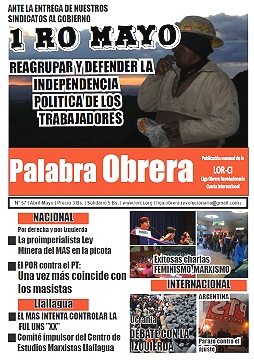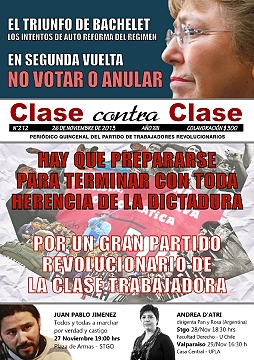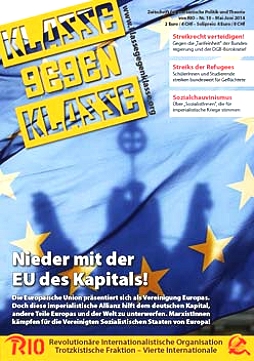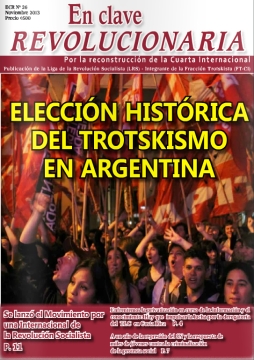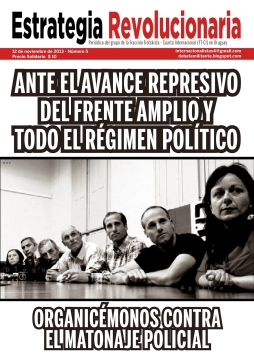Polemic with the PSTU-LIT
Cuba: Political revolution or "democratic revolution"?
29/09/2010
The media stir around Fidel Castro’s statement that "The Cuban model doesn’t even work for us any more", an obvious gesture of support for his brother Raúl’s policies of "updating the model" and the subsequent denial of that statement, is an expression of the fact that Cuba is immersed in a dynamic political process, caused by the difficult economic situation and the pro-market and fiscal belt-tightening measures, like the firing of 500,000 government workers.
This situation is opening a debate on the Trotskyist left about the current nature of the Cuban state, the Castro regime, and the policy that revolutionaries ought to put forward. The Brazilian PSTU and its international tendency, the LIT, maintain that "At the end of the 1980’s and the beginning of the 1990’s, the Castroite leadership began to develop a policy of capitalist restoration and of dismantling the bases of the workers’ state. The fundamental pillars of a planned economy (the central government plan and the monopoly of foreign trade) no longer exist, and the Cuban economy functions according to the capitalist laws of the market" (‘Regarding the death of Orlando Zapata Tamayo and freedom in Cuba’, March 15, 2010, at www.lit-ci.org).
For the LIT, Cuba is now one more capitalist country, recolonized "by European and Canadian imperialism." If this is true, how does the LIT explain the fact that the counter-revolutionary Miami Cuban bourgeoisie has not recovered its properties? Or the fact that there are no US investments in Cuba? Unless they believe that Washington has decided to give up economic control over the biggest of the Antilles to Spanish or Canadian imperialism, or, even worse, to Venezuela or Brazil. Or, capitalism having been restored 15 years ago, has Cuba kept big social conquests, even despite the neoliberal restorationist offensive? How has Cuba maintained important social conquests despite the fact that capitalism was apparently restored 15 years ago and there has been a neoliberal offensive? For the LIT, these are not very signiticant achievements; in another words "the last vestiges." But it is sufficient to see the terrible social consequences that restoration had in the USSR, where the indexes of social development fell in a stunning manner, or the countries of Eastern Europe that became reservoirs of cheap labor for the European monopolies, to realize that there is an essential difference between those countries and Cuba.
And this difference is not an economic or social achievement that could exist in a capitalist state, but the result of having expropriated the bourgeoisie, expelled imperialism and planned the economy, although bureaucratically. Even under the criminal US blockade, high indexes of social development exist in Cuba. Zero illiteracy, no malnutrition among children, a life expectancy of around 80 years, unemployment below 2%, infant mortality of 6 per 1000 (the average in Latin America is 14), a physician for every 150 inhabitants, etc., are a consequence of the profound social changes that occurred with the 1959 Revolution, which destroyed capitalist social relations in the country.
Capitalist reforms and the current state
The LIT confuses the process of liquidating the bureaucratic workers’ state with its completion. And, by denying the achievements of the Revolution that still remain, the LIT refuses to defend them. It is impossible to fight for what is new, without defending what has been won.
Historic bureaucratic deformations in the economy, like dependence on the single-crop farming of sugar, or the absence of workers’ control and management in the factories and in planning the economy, caused a stunning fall between 1989 and 1993, and a profound weakening of the bases of the workers’ state, with broad concessions to foreign capital in the "special period." These pro-capitalist reforms almost eliminated the state monopoly on foreign trade, which was practically suspended for the mixed enterprises (51% state and 49% foreign capital), and economic planning by breaking up the Planning Board and freeing the economy in big branches like tourism and mining (keeping public services, , agricultural production and local industrial production under state control.
The LIT confuses that severe erosion of the bases of the nationalized economy with the restoration itself and don’t make a concrete study of the current economy, taking into account the changes that have occurred in the last 15 years.
Yuvy Martínez Pérez, a graduate of Cienfuegos University, indicates that "beginning in 1990, the annual plan of the national economy ceased to be taken to the National Assembly of People’s Power (ANPP) [the legislature] for its approval, until 1995, when the economy began to stabilize, and the distinctive features of the economic and social plan were submitted for consideration by the ANPP; the approved figures were published by the Ministry of the Economy and Planning (MEP), and work on reestablishing control of the plan was begun (…) and by the year 2000,the system of planning gathered momentum (…)”. (‘The process of managerial planning in Cuba’, 2008).
The turn implemented since 2003
From 2003, several measures were taken that partially reversed the reforms of the special period. What was essential was maintained: the regime of mixed enterprises, the duty-free zones implemented in 1997, the extension of the system of "managerial improvement" and dual currency. But foreign investment was reduced, going from 358 mixed enterprises in 2000 to 250 in 2009, the circulation of the dollar was again prohibited (by extending the use of the convertible peso), which again centralized all the foreign currency in the Central Bank, permitting the state to recover control over the economy and over a large part of foreign trade.
A professor from the University of Pittsburgh indicates that in this period Fidel’s government "centralized the economic decisions, removed the dollar from the economy, created a single account in the Cuban Central Bank (BCC) for depositing all foreign currency, and cut the small self-employment private sector." Regarding the monopoly on foreign trade, he explains that "China broke the control of foreign trade by the central ministry and devalued the currency to make its exports competitive, while Vietnam deregulated the exchange rate and let the currency float with similar results. On the contrary, in 2003, Cuba reversed the modest decentralization of foreign trade of the 1990’s and reconcentrated power in the Ministry of Foreign Trade and the central bank" (Carmelo Mesa Lago, ‘The Cuban economy at the crossroads’).
Returning to the position of the LIT, how do they explain the absence of a local exploiting class and the fact that the bureaucracy limits itself to "defending the property of foreign enterprises"? The LIT simply cannot explain it. The fact is that the bureaucracy was unable even to become an owner of the fundamental means of production that continue in the hands of the state in association with foreign capital through mixed enterprises. As managers of these enterprises, officials make shady deals of every sort at government expense and try to position themselves so that they can take over public property in the future. The recent corruption cases of Rogelio Acevedo and Max Marambio are obvious examples of this (see La Verdad Obrera 382 and 384).
Since Raúl Castro replaced his brother in 2006 and, in 2007, announced his willingness to carry out "structural changes," the bureaucracy has accelerated its restorationist course. Although carried out “without haste and improvisations” subsidies have already been reduced, lands have been handed over to individual peasants and cooperatives provided they work them, wages have been linked to productivity, the retirement age has been raised and rationing has been increased, among other measures. However, the process of restoration is intimately linked to the degree to which the different imperialist powers, and especially the counterrevolutionary bourgeoisie exiled in Miami, recognize the bureaucracy as a valid negotiator and do not attempt retaliations for the expropriations of the 1960’s.
A "capitalist dictatorship" and a "democratic revolution"
The LIT maintains that since the character of the state has changed and, at the same time, the single-party dictatorship has remained, Cuba is today "a capitalist dictatorship," as Argentina was between 1976 and 1982, or Brazil from 1964 to 1984. Therefore, for this tendency, "the center of our program of demands for Cuba is the head-on struggle against the dictatorship and for the broadest democratic liberties for all the opposition tendencies, including the bourgeois ones" (idem).
Although the LIT has explained that this does not mean "any compromise with those bourgeois or pro-imperialist currents" and that it would permit "the workers to fight to make the socialist revolution," the fact is that they are now raising a merely bourgeois democratic program, in agreement with social-democratic and liberal groups that assert that Cuba’s central problem is the lack of democracy. Thus, they end up, in practice, like the final link of imperialist policy, of both the US and the European Union, that are attempting to restore capitalism through a democratic counterrevolution.
A political revolution: the only progressive solution for Cuba
The LIT section in Argentina, the FOS, a small group without any impact on the class struggle, repeating the ridiculous arguments of its ‘mother party’ – the MAS – accuses us of defending the Castro brothers. The PTS and the FT-CI are completely opposed to equating the defense of the achievements of the Revolution with the defense of the governing bureaucracy, like many "friends of Cuba," that "pretend not to notice" the role played by the Cuban armed forces, the most powerful institution in the country, now transformed into the main agent of capitalist restoration. “The armed forces control 30%of the state enterprises, as well as 65% of the foreign currency that enters the country. That is why they are the group in the best position to go from being administrators to owners associated with foreign capital.
That is why we fight for a political revolution that, starting from the defense of the gains of the Revolution, will defeat the imperialist blockade and put an end to the bureaucracy and its privileges. Against the single-party bureaucratic regime and against the program of establishing a bourgeois parliamentary democracy, we fight to overthrow the bureaucratic regime and establish a revolutionary workers’ state based on workers’, peasants’ and soldiers’ councils, and for the full legality for the parties that defend the achievements of the Revolution and claim to be anti-capitalist – a revolution that will review all the pro-capitalist measures imposed since the special period until now and impose democratic economic planning, and put a revolutionary leadership
at the head of the workers’ state and bind Cuba’s destiny to the international revolution.














